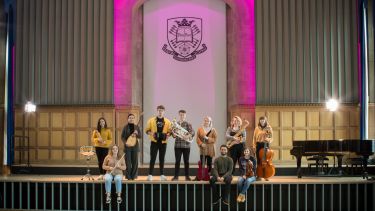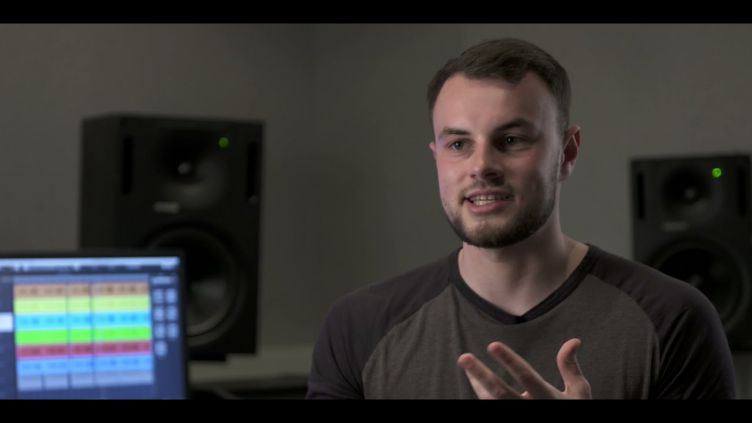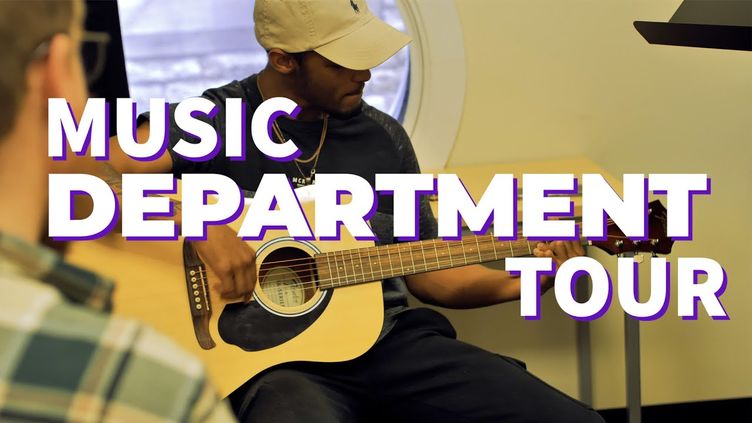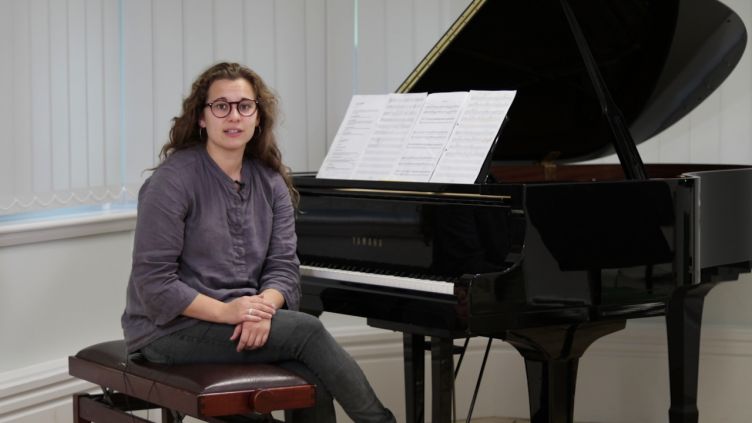Music BMus
Taught by world-leading academics, we offer a diverse and flexible range of modules, inspiring you to become the musician you want to be. We provide creative experiences within a range of musical industries to help you establish your professional career.
-
A Levels
AAB; ABB -
UCAS code
W302 -
Duration
3 years -
Start date
September
- Accredited
- Course fee
- Funding available
- FY Foundation year
- Optional placement year
- Study abroad
Explore this course:
Course description
Why study this course?
Learn from one of our distinguished professional teachers in the first year, whether or not you choose to take a performance module.
Gain practical industry experience while you learn with our 'Work in Music' module, and build a network of professionals who can advise you on your career.
Enjoy the city’s vibrant music scene that gave birth to the likes of Self Esteem, PULP and Arctic Monkeys. Feed off this inspiring musical heritage, and collaborate with our regional industry partners.
Opportunities include student-led reading groups, multiple ensembles, active student societies, masterclasses and our dynamic musical event series.

Become an independent musician and music researcher, find your creative voice and take your first steps towards forging a rewarding, international career.
A music degree from ∫˘¬´”∞“µ is about supporting you to become the musician you want to be. Taught by world-leading academics, you‚Äôll study everything from performance, composition and musicology, to ethnomusicology, music psychology, musical industries and technology.
You’ll learn to listen, perform, think and write critically about music of multiple genres, delve into the histories and cultural contexts of music both at home and from around the world, and have the chance to receive compositional training in both instrumental and music technology software.
Together we embrace all music genres and perspectives on music, encouraging you to develop your skills as an independent musician and music researcher.
Culminating in a final year project, taught over a full academic year in group sessions and regular tutorials, this degree will help establish a portfolio of work that will help you find success in a range of careers.
∫˘¬´”∞“µ is an All-Steinway School. This accreditation enables students to access pianos of the highest quality and places the University among a select group of international education institutions.
Modules
UCAS code: W302
Years: 2026
You will learn about the global context of Music through its history, psychology and more to make up 80 credits.
You'll also have the option to choose optional modules totalling up to 40 credits.
Core modules:
- Music in a Global Context
-
Whatever kind of music study you decide to specialise in, you'll do it better if you see it in the context of music as a phenomenon common to all humanity. You'll understand what's different about your own chosen field but also how the music you love derives from diverse cultural sources.In this module we examine how any music uses specific ways of organising sound to serve particular cultural purposes. You'll learn to recognise and describe diverse musical styles, research them through scholarly sources, present an analysis using appropriate audio-visual technology, and take control of the transferable skills you're developing.
20 credits - Digital Skills for Music
-
The module aims to develop your confidence and technical expertise with a range of technologies of value to academic and professional practice. Lectures will introduce fundamental principles and specific technologies for use in researching, creating and producing music. These technologies will then be applied in the production of a collaborative project, helping students to develop team work and interpersonal skills that will serve them in subsequent levels of study and professional practice.
20 credits
Indicative areas of study include audio recording and production, sound design, computational literacy, data analysis, the ethics of artificial intelligence, effective group work, research management and productivity. - History of Western Music
-
This module considers key moments in the history of Western music from the 1500s to the present day. Taking individual composers and works, it aims to introduce students to different approaches to the study of music history, the development of particular musical genres, and the impact of cultural, historical and geographical context on composers. In addition, the module will consider ways of writing about music, and the use of primary and secondary sources for informing critical discussions of the subject.
20 credits - Psychological Foundations of Music
-
Music Psychology offers insights, ways of thinking, reflective tools and methods to understand the foundations of musical behaviour, learning and thought. This module offers the foundation to students to be able to engage with the literature, knowledge and underpinning techniques in this area. Learning about psychology of music will help you engage with some of the most provocative questions about musicality, such as what enables our capacity for music, why we respond emotionally to music, whether music makes us smarter, and what underlies therapeutic applications of music for health and wellbeing?
20 credits
Optional modules:
- Composition
-
In this module you will develop your composition skills, practice writing music in staff notation, and learn to write effectively for different instrumental and vocal forces. Drawing on the models of a diverse range of classical composers of the 20th and 21st centuries, we will focus on techniques for writing inventive melodies and rhythms, and employing wide-ranging approaches to harmony. The module aims to give you a foundation in composition and increase your confidence in preparation for further study.
20 credits - Performance
-
In this module you will develop the musical and intellectual abilities appropriate to solo performance. The theoretical background is considered, focusing on the aural and analytical skills essential to performance at an advanced level. An awareness of style and interpretation, as well as effective preparation and communication are built into teaching. You will receive one to one tuition in addition to attending whole class performance lectures.
20 credits - Popular Music Studies
-
This module provides an introduction to the academic study of popular music. You will explore key approaches to studying popular music in its socio-cultural contexts, investigating major issues and debates. Lecture materials and in-class tasks will engage with approaches to the analysis of popular music and media, issues of representation, authenticity, identity, technology and industry. The module is delivered via lectures and group tasks to encourage interaction and collaboration between students. Assessments are designed to allow you to apply key analytical and theoretical frameworks to music of your own choosing, testing both your individual skills and knowledge alongside group work and collaboration.
20 credits - Music Analysis
-
This module aims to introduce, develop and refine ways of thinking, listening and writing about western music. ¬ÝYou will learn to listen to and analyze harmonic, tonal, motivic, thematic, melodic, rhythmic, textural and formal features of a range of western music genres, such as Common Practice harmonic principles, Medieval counterpoint, jazz standards and rock'n'roll. ¬ÝBy using analytical techniques to reveal distinctive structural characteristics across multiple styles of music, this module not only prepares you for western-music-based modules at FHEQ levels 5 and 6 ¬Ýbut also provides new models of approaching music that can be applied in wider creative and empirical contexts.
20 credits
You’ll have the opportunity to tailor your degree to your interests by taking a range of modules spanning areas such as studio practice, performance, improvisation, composition and more. The core modules will make up 80 credits and the optional modules will make up 40 credits.
As well as a research project (to make 40 credits), you’ll have the opportunity
to tailor your degree to your interests by taking a range of modules (to make 80 credits) spanning areas such as musicology, community, education, moving image and more.
The content of our courses is reviewed annually to make sure it's up-to-date and relevant. Individual modules are occasionally updated or withdrawn. This is in response to discoveries through our world-leading research; funding changes; professional accreditation requirements; student or employer feedback; outcomes of reviews; and variations in staff or student numbers. In the event of any change we will inform students and take reasonable steps to minimise disruption.
Learning and assessment
Learning
Our teaching ranges from academic to hands-on. You'll learn through a combination of lectures, seminars, interactive classes and tutorials, and you'll be expected to carry out independent study, assignments and instrument practice. Instrumental lessons are available in your first year and throughout the rest of your degree if you choose to take assessed performance modules.
Our staff research directly informs the content of our degrees and we bring our expertise and ideas into all our teaching, so you’ll benefit from being introduced to the latest discoveries at the forefront of musical research.
Assessment
A few of our modules include formal exams but the majority of your assessment is through coursework (for example essays, journals, compositions, recordings, group projects) and assessed performances.
Entry requirements
With Access ∫˘¬´”∞“µ, you could qualify for additional consideration or an alternative offer - find out if you're eligible.
The A Level entry requirements for this course are:
AAB; ABB
AAB, including Music; ABB + Grade 8 in either Practical (ABRSM/Trinity/Rockschool/LCME or equivalent) or Performance (ABRSM/ARSM/Rockschool/Trinity) + Grade 5 Theory (ABRSM/Trinity/LCME)
- A Levels + a fourth Level 3 qualification
- ABB, including Music + B in a relevant EPQ
- International Baccalaureate
- 34, with 5 in Higher Level Music; 33 + Grade 8 in either Practical (ABRSM/Trinity/Rockschool/LCME or equivalent) or Performance (ABRSM/ARSM/Rockschool/Trinity) + Grade 5 Theory (ABRSM/Trinity/LCME); 33, with 5 in Higher Level Music, and B in a music-based extended essay
- BTEC Extended Diploma
- DDD in Music
- BTEC Diploma
- DD + B in A Level Music; DD in Music + A at A Level
- Scottish Highers
- AAAAB, including Music; AAABB + Grade 8 in either Practical (ABRSM/Trinity/Rockschool/LCME or equivalent) or Performance (ABRSM/ARSM/Rockschool/Trinity) + Grade 5 Theory (ABRSM/Trinity/LCME)
- Welsh Baccalaureate + 2 A Levels
- B + AA, including Music; B + AB + Grade 8 in either Practical (ABRSM/Trinity/Rockschool/LCME or equivalent) or Performance (ABRSM/ARSM/Rockschool/Trinity) + Grade 5 Theory (ABRSM/Trinity/LCME)
- Access to HE Diploma
- Award of the Access to HE Diploma in Music, with 45 credits at Level 3, including 36 at Distinction and 9 at Merit
-
Music Technology is acceptable in lieu of Music
The A Level entry requirements for this course are:
ABB; BBB
ABB, including Music; BBB + Grade 8 in either Practical (ABRSM/Trinity/Rockschool/LCME or equivalent) or Performance (ABRSM/ARSM/Rockschool/Trinity) + Grade 5 Theory (ABRSM/Trinity/LCME)
- A Levels + a fourth Level 3 qualification
- ABB, including Music + B in a relevant EPQ
- International Baccalaureate
- 33, with 5 in Higher Level Music; 32 + Grade 8 in either Practical (ABRSM/Trinity/Rockschool/LCME or equivalent) or Performance (ABRSM/ARSM/Rockschool/Trinity) + Grade 5 Theory (ABRSM/Trinity/LCME)
- BTEC Extended Diploma
- DDD in Music
- BTEC Diploma
- DD in Music + B at A Level
- Scottish Highers
- AAABB, including Music; AABBB + Grade 8 in either Practical (ABRSM/Trinity/Rockschool/LCME or equivalent) or Performance (ABRSM/ARSM/Rockschool/Trinity) + Grade 5 Theory (ABRSM/Trinity/LCME)
- Welsh Baccalaureate + 2 A Levels
- B + AB, including Music; B + BB + Grade 8 in either Practical (ABRSM/Trinity/Rockschool/LCME or equivalent) or Performance (ABRSM/ARSM/Rockschool/Trinity) + Grade 5 Theory (ABRSM/Trinity/LCME)
- Access to HE Diploma
- Award of the Access to HE Diploma in Music, with 45 credits at Level 3, including 30 at Distinction and 15 at Merit
-
Music Technology is acceptable in lieu of Music
You must demonstrate that your English is good enough for you to successfully complete your course. For this course we require: GCSE English Language at grade 4/C; IELTS grade of 6.5 with a minimum of 6.0 in each component; or an alternative acceptable English language qualification
Equivalent English language qualifications
Visa and immigration requirements
Other qualifications | UK and EU/international
If you have any questions about entry requirements, please contact the school/department.
Graduate careers
School of Languages, Arts and Societies
The musical excellence and academic aptitude you develop on your course will make you highly valued by employers, whatever your chosen career path after university. You'll also develop valuable transferable skills such as time management, critical thinking and interpersonal communication.
There are lots of opportunities to get work experience. Hands-on projects are integrated into several academic modules and every year our Concerts team provides internships while the Careers Service can help you find placements. You can lead a music project or workshop in a local school through our student-led volunteering organisation Music in the City. All of these experiences will help you build a compelling CV.
Our graduates work with prestigious orchestras and music institutions within the UK and globally, in roles ranging from performing and conducting to administration and education. ∫˘¬´”∞“µ music graduates have also forged successful careers in other fields, from audio programming to marketing and management.
Graduate job roles include: artist management, audio programming, composition, concerts coordination, instrument repair, marketing and communications, music research, music promotion, music therapy, orchestral management, professional performance, publishing, sound engineering, teaching.
School of Languages, Arts and Societies
National Student Survey 2022
The Times and Sunday Times Good University Guide 2024
Research Excellence Framework 2021
∫˘¬´”∞“µ is proud to be an All-Steinway School
Our department ethos combines high achievement with a sense of community and a shared passion for music. Our internationally recognised research informs our high-quality teaching and our student experience is second to none.
∫˘¬´”∞“µ is celebrated as one of the UK's leading music cities, with dozens of major venues from the City Hall and Crucible to the Leadmill and the Foundry, covering all music genres. This brings with it a host of opportunities for our students to get involved in professional music-making of the highest quality.
You can also enjoy events from which hosts concerts and masterclasses from touring professional musicians throughout the year.
Department of Music students study at the heart of the campus in our Jessop Building, Soundhouse and performance facilities. We timetable teaching across the whole of our campus.
Facilities
Specially designed for music study, our £8.5m facilities provide the ideal environment for our diverse and cutting-edge teaching and research.
∫˘¬´”∞“µ are proud to be an All-Steinway School, which places us among a select group of international education institutions. This accreditation means that you'll have access to pianos of the highest quality.
The Jessop Building houses study and rehearsal rooms, with dedicated specialist spaces including our historical instruments collection, ethnomusicology space and collection, music psychology lab and music technology lab.
The Soundhouse is our purpose-built facility for instrumental lessons, practice, small-scale rehearsals and sound recording, and houses the internationally-renowned University of ∫˘¬´”∞“µ Sound Studios for recording and electroacoustic composition.
∫˘¬´”∞“µ is also home to a suite of performance venues, including the beautiful 380-seater Firth Hall, set in the stunning Edwardian Grade II listed Firth Court and home to the University‚Äôs multi-genre Concert Series.
University rankings
A world top-100 university
QS World University Rankings 2026 (92nd) and Times Higher Education World University Rankings 2025 (98th)
Number one in the Russell Group
National Student Survey 2024 (based on aggregate responses)
92 per cent of our research is rated as world-leading or internationally excellent
Research Excellence Framework 2021
University of the Year and best for Student Life
Whatuni Student Choice Awards 2024
Number one Students' Union in the UK
Whatuni Student Choice Awards 2024, 2023, 2022, 2020, 2019, 2018, 2017
Number one for Students' Union
StudentCrowd 2024 University Awards
A top 20 university targeted by employers
The Graduate Market in 2024, High Fliers report
Student profiles
Fees and funding
Fees
Additional costs
The annual fee for your course includes a number of items in addition to your tuition. If an item or activity is classed as a compulsory element for your course, it will normally be included in your tuition fee. There are also other costs which you may need to consider.
Funding your study
Depending on your circumstances, you may qualify for a bursary, scholarship or loan to help fund your study and enhance your learning experience.
Use our Student Funding Calculator to work out what you’re eligible for.
Additional funding
The Department of Music offers a number of scholarships. These can include scholarships in partnership with local music organisations, giving you a chance to gain advanced work experience within the music sector while studying.
Alternatively, we can offer bursaries donated by alumni to help support you with your studies. Both single honours BMus students and dual honours students with music are eligible to apply.
Placements and study abroad
Placements
There are other opportunities to get work experience, with hand-on projects integrated into several of our academic modules. In addition, you could lead activities with local schools through our student-led volunteer organisation, Music in the City, or release music through our department record label, Octagon Records. ∫˘¬´”∞“µ Concert Series also offers internships training you in music management skills.
All of these experiences will help you build a compelling CV.
Study abroad
Visit
University open days
We host five open days each year, usually in June, July, September, October and November. You can talk to staff and students, tour the campus and see inside the accommodation.
Subject tasters
If you’re considering your post-16 options, our interactive subject tasters are for you. There are a wide range of subjects to choose from and you can attend sessions online or on campus.
Offer holder days
If you've received an offer to study with us, we'll invite you to one of our offer holder days, which take place between February and April. These open days have a strong department focus and give you the chance to really explore student life here, even if you've visited us before.
Campus tours
Our weekly guided tours show you what ∫˘¬´”∞“µ has to offer - both on campus and beyond. You can extend your visit with tours of our city, accommodation or sport facilities.
Events for mature students
Mature students can apply directly to our courses. We also offer degrees with a foundation year for mature students who are returning to education. We'd love to meet you at one of our events, open days, taster workshops or other events.
Apply
The awarding body for this course is the University of ∫˘¬´”∞“µ.
Recognition of professional qualifications: from 1 January 2021, in order to have any UK professional qualifications recognised for work in an EU country across a number of regulated and other professions you need to apply to the host country for recognition. Read and the .
Any supervisors and research areas listed are indicative and may change before the start of the course.







